Blackjack Play Options
What makes the game of blackjack more entertaining is that sometimes you have the ability to increase your bets in mid-hand if you feel you have a good opportunity to win. When presented with the opportunity to make these bets, you should take advantage of them because they help to eliminate the house edge.
One of the circumstances in which you may increase your bet is called doubling down. As the name implies, doubling down means that you are doubling your wager on the chance that you will win. You can double down only after looking at your first two cards; you cannot take a hit and then double down. In many casinos you can double down for less than what you originally wagered, some will allow you to double down on any two cards, and some will allow you to double down after splitting a pair. The only catch is that you must take one, and only one more card. The casino is essentially allowing you to make a second bet equal in size in exchange for the disadvantage of allowing only one more card for your hand.
Most players will double down when their first two cards total ten or 11. The reasoning behind this is that odds are good that their next card dealt will be a ten, giving a total of 20 or 21. Odds are in favor of receiving a 10-card because they are the most frequently occurring card being that all face cards have a value of ten. To tell the dealer you want to double down, you slide a second wager next to your original wager in the betting circle. Do not place the additional bet on top of the original wager, because the dealer may think you are trying to cheat by increasing your bet illegally. If you win your bet, you are paid even money for the two bets, and receive double your original wager. If you lose, both bets are taken away. In the event of a push, you keep both bets, but are not paid.
There is another option by which you can increase your original wager known as splitting. When you receive a pair, two cards of the same value such as two 8's, you are allowed to match your original bet and split the two cards into separate hands. Each card of the pair becomes the first card of an independent hand, with a wager that applies only to the hand to which it is attached. Split hands are then played out one after the other, both receiving an additional card and then following the route of hitting and standing. Because the two hands are independent, both hands may be lost, won, or a combination of the two.
To split a hand you place an identical bet next to your original bet. You may be allowed to split hands up to four times, but the rules concerning how many times you may do that vary from casino to casino. Splitting aces are special, for when you do, you receive only one card on each ace. If you obtain a blackjack on a split pair you will only be paid 1:1 for it is not a true blackjack (having not originally been dealt a two-card hand of 21).
Insurance is a side bet that the dealer has a natural, and it is only offered when the dealer's upcard is an ace. When the dealer has an ace card showing, it is assumed that the dealer could have a 10 card as their hole card. Each player is asked if they would like to insure their hands, and if they accept, the player must put up one-half of his original bet before play on anyone's hand commences. If the dealer does have a blackjack, then the insurance wager wins and the player is paid off at a rate of 2:1.
One option that is not offered in all casinos is surrender. What this means is that you are allowed to turn in a bad hand without playing it, for the cost of half of your original bet. Obviously surrender is only to be used as a last resort, and is only offered when the dealer has an ace or a ten-value card up. If your first two cards leave you with a very bad hand and you believe you have no chance to beat the dealer, you verbally announce that you would like to surrender.
There are two types of surrender sometimes offered: early or late surrender. Early surrender, where the dealer immediately takes half of your bet, is the most advantageous because you are guaranteed to keep half of your money. In late surrender the dealer either marks your bet with a plastic chip called a lammer, or he places your chips on top of your cards and you have to wait to see what the dealer's hand holds. The disadvantage of late surrender is that if the dealer has blackjack, he takes your entire bet.
Blackjack Rules
Blackjack uses a six deck shoe.
The face cards - jack, queen and king, all have a value of 10, aces count as either 1 or 11, and the remaining cards are worth their face value.
If your hand exceeds 21, you bust and automatically lose the hand. If you have the same card total as the dealer, from 17 and up, no one wins and you get your wager back in a push.
The dealer must stand on 17 and above and draw on 16 and below.
If the dealer's face-up card is an ace, you will be asked if you wish to buy insurance.
You Win at Blackjack!
If you get Blackjack (21), the payout is 3:2. If your hand beats the dealer's hand but does not equal 21, the payout is 1:1.
| Hand | Who wins? |
|---|---|
| Dealer busts (hand exceeds 21) | Player wins |
| Player's hand is closest to 21 | Player wins |
| Player busts (hand exceeds 21) | Dealer wins |
| Dealer's hand is closest to 21 | Dealer wins |
| Hands are equal or a push is achieved | No loss or gain |

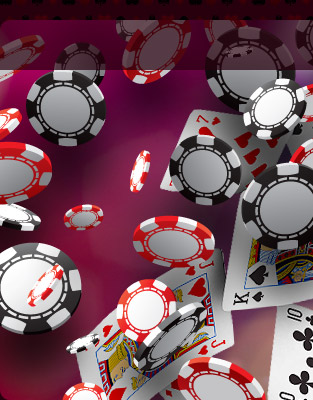
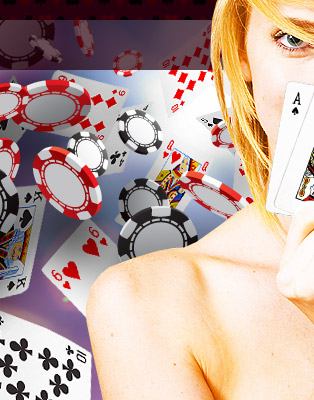
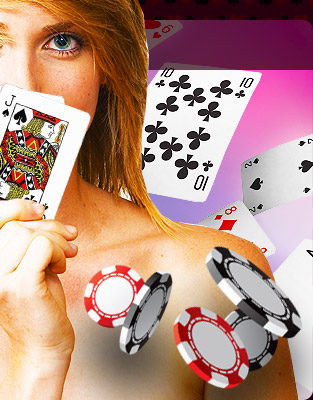
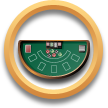 PLAY BLACKJACK NOW The object of Blackjack is to beat the dealer by accumulating a higher score than the dealer without going over 21, or sitting on a lower score and hoping that the dealer "busts"
PLAY BLACKJACK NOW The object of Blackjack is to beat the dealer by accumulating a higher score than the dealer without going over 21, or sitting on a lower score and hoping that the dealer "busts" 
 PLAY BACCARAT NOW Players can wager on the "Player", the "Banker", or a "Tie", while trying to obtain a total card value closest to nine. A third card may be drawn, depending on the hand's value.
PLAY BACCARAT NOW Players can wager on the "Player", the "Banker", or a "Tie", while trying to obtain a total card value closest to nine. A third card may be drawn, depending on the hand's value. 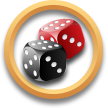 PLAY CRAPS NOW On the first roll, the shooter tries to establish a point with one of the following numbers: 4, 5, 6, 8, 9, 10. If the shooter rolls a 7 or 11, the wager is paid off at even money.
PLAY CRAPS NOW On the first roll, the shooter tries to establish a point with one of the following numbers: 4, 5, 6, 8, 9, 10. If the shooter rolls a 7 or 11, the wager is paid off at even money. 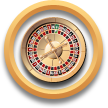 PLAY ROULETTE NOW Players try to determine which number or color the ball will land on. Roulette evolved to include a spinning wheel with 38 numbers and two zeros.
PLAY ROULETTE NOW Players try to determine which number or color the ball will land on. Roulette evolved to include a spinning wheel with 38 numbers and two zeros.